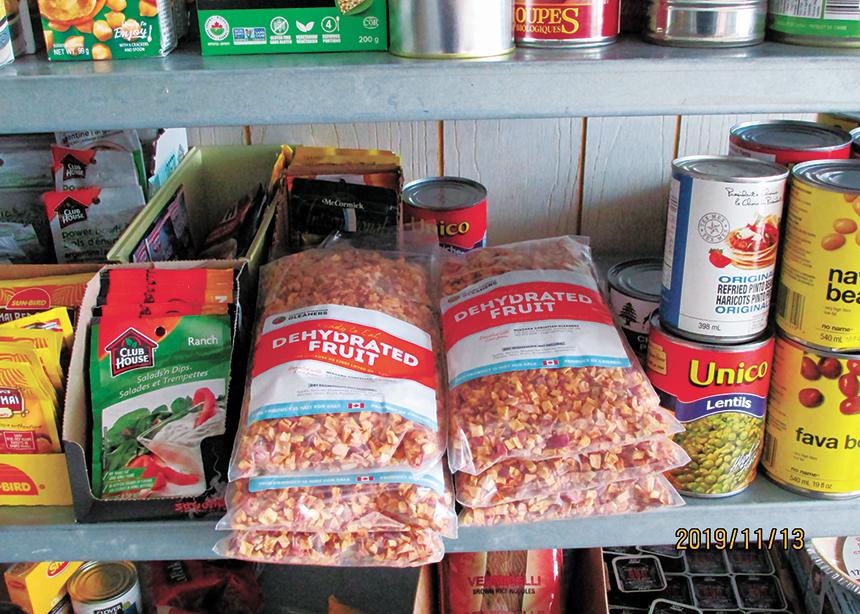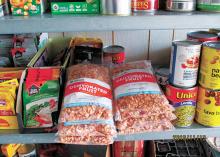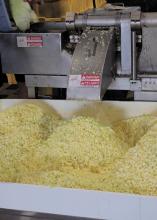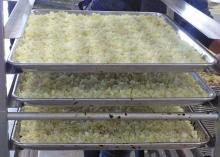The Niagara Network Hub of Mennonite Economic Development Associates (MEDA) recently toured the Niagara Christian Gleaners facility in Smithville. The new non-profit organization aims to divert nearly 3,200 kilograms of produce each day from the local landfill by chopping, dehydrating, packaging and shipping fruits and vegetables to areas where the food is needed. While this concept is not new to Ontario, it is the first such plant in the Niagara Peninsula.
Pete Wierenga, general manager of the Gleaners, led the MEDA group through the plant that opened in September 2018, with production beginning last December. The plant relies on 75 volunteers each day to wash and prepare the fruits and vegetables for chopping/dicing and drying. The plant has two chopping/dicing machines and one commercial dehydrator.
The fruits and vegetables come from local farmers and grocery stores; from as far away as the Holland Marsh in Bradford; and from wholesalers like Streef Produce, a large farming operation in Princeton.
There is nothing nutritionally wrong with the food, Wierenga said. However, there is a limited market for less-than-perfect produce. Such downgraded and surplus food eventually goes for cattle feed or is discarded into landfills.
The Gleaners’ produce acquisition team ensures that a steady supply of fruits and vegetables is donated to the facility. The team has been able to develop a strong food donor relationship, with a trucking company helping with transportation.
A fellowship room is part of the community building, and each day starts off with devotions. Volunteers, including many high school students, come to help regularly; sometimes there are three generations of the same family working side by side. Each volunteer adds more than 200 servings of food to the Gleaners’ daily output.
Each box contains 20 packages of dehydrated fruits or vegetables, which are available at no cost to aid organizations that distribute them to areas where food security is a challenge. Niagara Christian Gleaners partners with organizations in the countries receiving these shipments of dried food, including Hope and Healing International in Eswatini (formerly Swaziland), whose shipment totalled nearly 650,000 servings. In Pignon, Haiti, the shipment is part of a school nutrition program that feeds more than 1,000 children a day.
Supported by 60 local churches, it took about a year to raise the money to build the plant. Services and materials were donated by local contractors. Wierenga said the Gleaners’ project speaks to anyone who wants to help others, regardless of religious affiliation.
In early July, a number of Mennonite Central Committee (MCC) Ontario staff visited the Smithville facility and met with its board about possibly working together to send shipments of food boxes to Indigenous communities in northern Ontario, where the high price of food, triple the price of food in the Niagara Region, limits how much people can afford to buy.
MEDA tour participants viewed the first shipment of dried food that was being sent to Timmins as part of this new MCC-Gleaners partnership.
The first shipment, consisting of 80 boxes of dried vegetables and 40 boxes of dried fruits, was sent to the Timmins Food Bank recently. From there, boxes are being sent to food banks in South Porcupine, Cochrane, Hearst, Kapuskasing and Kirkland Lake.
According to Lyndsay Mollins Koene, MCC Ontario’s Indigenous Neighbours Program coordinator in Timmins, these food banks are strong regional partners with MCC, and share large donations such as this to ensure northern Ontario’s First Nations residents have access to healthy and nutritious food.






Add new comment
Canadian Mennonite invites comments and encourages constructive discussion about our content. Actual full names (first and last) are required. Comments are moderated and may be edited. They will not appear online until approved and will be posted during business hours. Some comments may be reproduced in print.